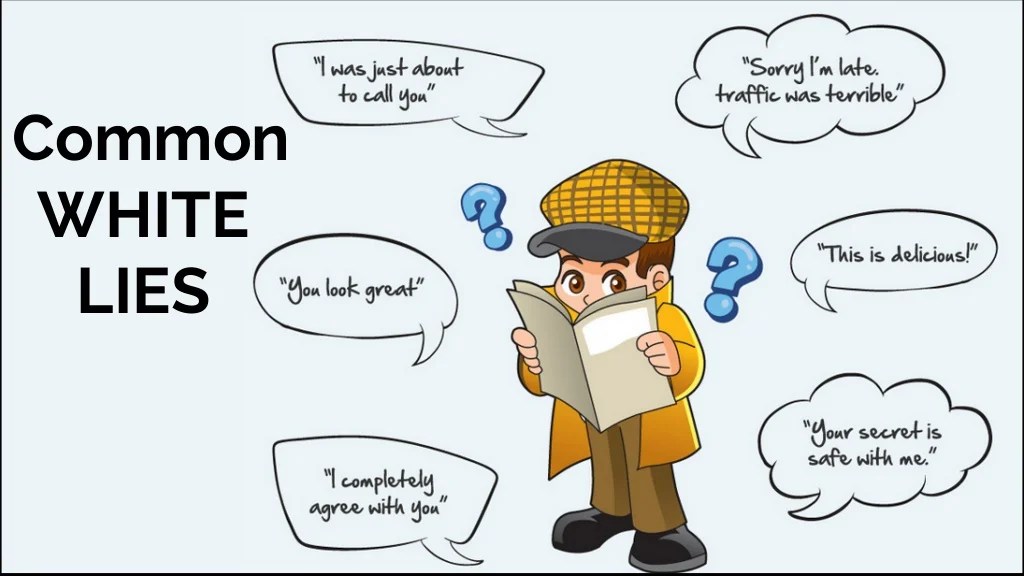White lies are a part of everyday life, and many of us have told a white lie at some point, whether to spare someone’s feelings or to avoid an awkward situation. But what exactly constitutes a white lie, and how do these seemingly innocent deceptions play out in our daily interactions? By examining various white lie examples, we can gain a deeper understanding of their role in social dynamics and the ethical implications they might carry.
White lies are often regarded as harmless, or even necessary, in maintaining social harmony. They are the small, sometimes insignificant lies told to protect someone from discomfort or to prevent unnecessary conflict. Unlike more serious lies, white lies are not intended to deceive or manipulate for personal gain but rather to maintain the peace and foster goodwill. Despite their seemingly benign nature, white lies can sometimes lead to unintended consequences if not handled thoughtfully.
In exploring white lie examples, it's essential to consider the context in which they are told and the potential impact on relationships and trust. While some white lies can be seen as acts of kindness, others might be viewed as undermining honesty and authenticity. In this article, we will delve into various situations where white lies might occur, examine the motivations behind them, and question whether they are always the best course of action. By doing so, we aim to shed light on this common social phenomenon and offer insights into navigating the complex world of truth and deception.
What is a White Lie and Why Do We Tell Them?
White lies are often described as minor or unimportant lies that are told to avoid hurting someone's feelings or to prevent a minor inconvenience. These lies are typically considered socially acceptable because they can help maintain polite social interactions and protect the feelings of others. But why do we feel the need to tell white lies? There are several reasons, including the desire to be kind, to avoid conflict, or to present ourselves in a more favorable light.
Are White Lies Always Harmless?
While many people believe that white lies are harmless, this is not always the case. The impact of a white lie can vary depending on the context and the individuals involved. In some situations, a white lie might spare someone's feelings and strengthen a relationship, while in others, it might lead to a breakdown of trust if the truth is eventually revealed. It's important to consider the potential consequences of a white lie before deciding to tell one.
White Lie Example: Common Situations Where White Lies Occur
White lies are prevalent in many everyday situations. Here are a few common examples:
- Telling a friend you love their new haircut, even if you don't, to make them feel good.
- Praising a child's drawing, regardless of its quality, to encourage their creativity.
- Informing a host that their meal was delicious when it was not, to show appreciation for their effort.
How Do White Lies Affect Relationships?
White lies can have both positive and negative effects on relationships. On the positive side, they can help maintain harmony and prevent unnecessary conflicts. However, if a person frequently relies on white lies, it may lead to a lack of trust and authenticity in the relationship. It's crucial to strike a balance between honesty and kindness to ensure that relationships remain strong and healthy.
When Should You Avoid Telling a White Lie?
While white lies can sometimes be beneficial, there are situations where it's better to avoid them altogether. These include scenarios where honesty is crucial, such as when providing feedback that could affect someone's future decisions or when the lie could cause more harm than good if discovered. In such cases, it's important to communicate truthfully and constructively.
Can White Lies Be Ethical?
The ethics of white lies is a complex topic. Some argue that white lies can be ethical if they are intended to protect someone's feelings or prevent harm. However, others believe that honesty should always be prioritized, regardless of the situation. Ultimately, the ethicality of a white lie depends on the intent behind it and the potential impact on all parties involved.
Famous White Lie Example from Pop Culture
Pop culture is replete with examples of white lies. One famous instance is the classic film "Mrs. Doubtfire," where the protagonist, played by Robin Williams, disguises himself as a female housekeeper to spend more time with his children after a divorce. While the lie is motivated by love and the desire to be close to his family, it raises questions about honesty and deception.
How Can We Navigate the Fine Line Between Honesty and White Lies?
Navigating the fine line between honesty and white lies requires careful consideration of the situation, the intent behind the lie, and the potential consequences. It's essential to weigh the benefits of telling a white lie against the value of being truthful. In some cases, it may be possible to communicate honestly while still being sensitive to the other person's feelings. Practicing empathy and active listening can help find a balance between honesty and kindness.
In conclusion, the concept of white lies is deeply embedded in social interactions, and understanding their nuances can help us make more informed decisions about when and why to use them. By examining white lie examples and considering their effects on relationships, we can learn to navigate the delicate balance between honesty and compassion in our daily lives.


